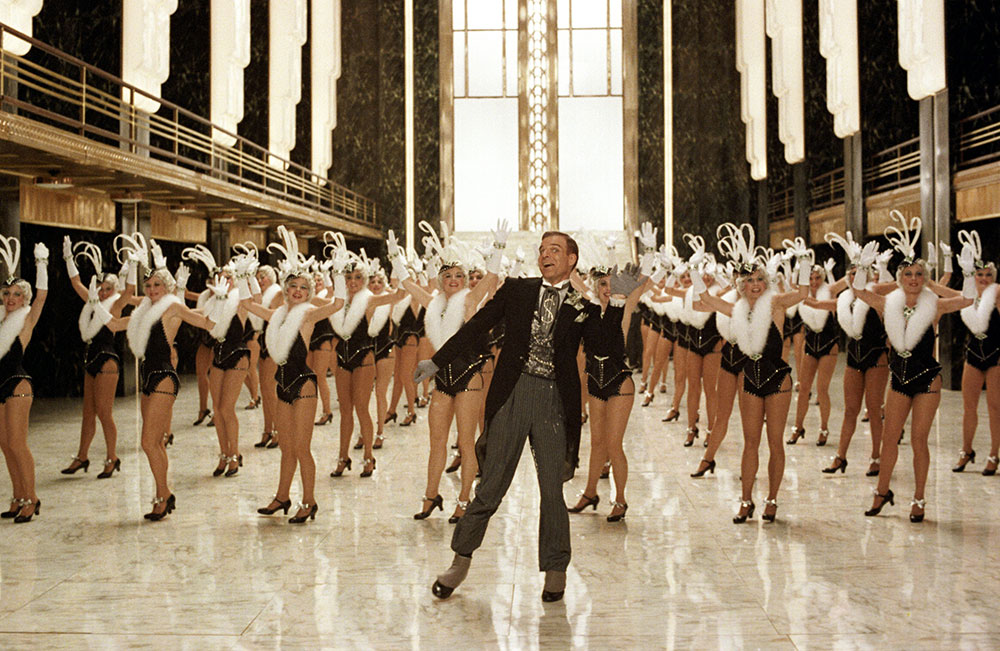Herbert Ross’s acrid jukebox musical Pennies from Heaven (1981) charts the exploits of hapless songs salesman Arthur (Steve Martin), who peddles sheet music in 1930s Illinois. Though times are tough, and business is tougher, most of his aspirations and disappointments are confined to the bedroom, where he feels rejected by his better half Joan (Jessica Harper). The film sees him stray from his wife both physically and spiritually, pantomiming the romantic delusions of Great Depression radio hits along the way. Ross’s approach to the musical form is slippery in two-fold. Throughout the film, actors’ mouths lip sync below desperate, hopeful eyes. But when we return to their reality, the illusion of promise is broken for both the characters and the audience. The people on-screen have no choice but to take things in stride, but we feel cheated on their behalf. The film’s technique is upfront about its dishonesty, yet it still invites the viewer to buy into the fantasy.
The rest of the characters in the film join Arthur in his double-edged flights of fancy, placing their trust in a man out to sap them––consciously or not––of every resource they have. “I believed myself,” he tells the repressed schoolteacher Eileen (Bernadette Peters) as she laments her own belief in his sexually coercive sob stories. And strange as it sounds, we’re inclined to believe him as well. Arthur’s betrayal of Joan leaves Eileen penniless and pregnant, and his refusal to take responsibility for these deceptions leads her to be preyed upon and pimped out by the vulpine lounge-lizard Tom (Christopher Walken). He not only convinces the prudish Joan to win back his affections in the bedroom, but also to subsidize his ill-conceived record store with inherited money she’d been saving for a rainy day. As the women’s respective degradations run parallel—the former in the home, the latter on the street—fateful encounters between Arthur, a blind waif (Eliska Krupka), and a stammering accordionist (Vernel Bagneris) pave a path toward his karmic punishment. As the film makes increasingly clear, this is a man whose rainy day will never end.
Though critics like Dave Kehr assessed Pennies from Heaven’s bitter sarcasm as a “lofty contempt for the [musical] form,” Ross’s sledgehammer sensibility belies a profound empathy for his characters and their bottomless capacity to be hoodwinked by the seductive fantasies of pop culture. The imaginary musical interludes in the film, lent a sickly-sweet luminosity by cinematographer Gordon Willis, conjure conflicting notions of tactility and detachment. Tongue-in-cheek homages to the gear-turning gigantism of Busby Berkeley exist side-by-side with small-scale duets in the mode of Ernst Lubitsch and Ruben Mamoulian, weaving wistful humour through the textures of larger-than-life artifice and everyday intimacy. These sequences offer a fleeting and illusory reprieve from the characters’ harsh circumstances, but they also manufacture a dreamworld of desire and expectation that leads them astray, clouds their judgement, and primes them for disappointment.
Pennies from Heaven’s excavation of the musical crests with two showstopping ruptures. The title number sees the walls of a diner peel away, allowing Bagneris to venture out into the artificial downpour and perform a strange, twisting dance of simultaneous anguish and jubilation. A late sequence, in which Arthur and Eileen attend a screening of the Astaire/Rogers vehicle Follow the Fleet, sees the characters replace the stars and enter the screen, performing one last deluded duet to “Let’s Face the Music and Dance” as a line of backup dancers marks time, and space, with their canes. Fates are sealed as the pair leaves the theatre, bringing the film’s porous approach to both set and screen full circle. The circular irony continues and concludes as the camera rejects the narrative’s outcome, returning to the opening sequence’s fabricated sunscape with an irreparable knowledge of the darkness below.
Pennies from Heaven screens tomorrow afternoon, January 18, at the Paris Theater on 35mm as part of the series “Skipped a Beat: Emilia Pérez and Musicals on the Edge.”



